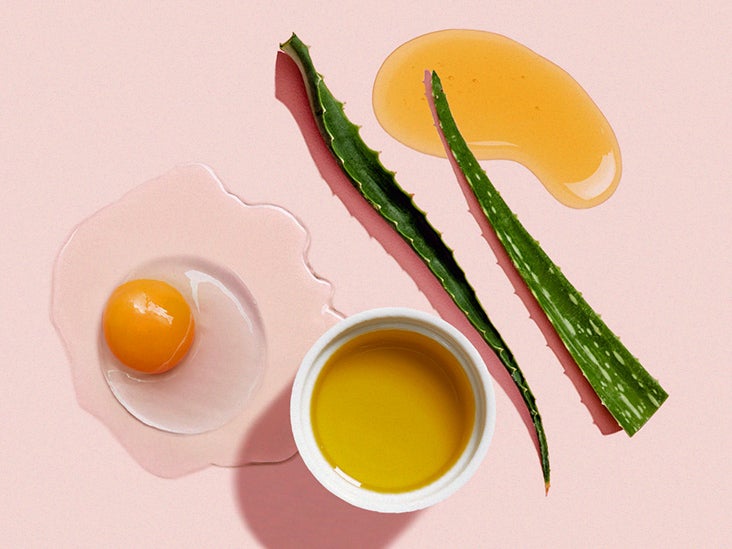How to Use Flaxseed for More Beautiful Hair: Benefits, Risks & More
Although used for centuries in nutrition and complementary health practices, flaxseed has created buzz for a whole other purpose: your hair.
Whether you apply flaxseed topically as an oil, or perhaps eat more ground flaxseed on a regular basis, there's a belief that doing so will make your hair stronger for better growth and overall manageability.
While research is slim, there's no doubt that ground flaxseed and flaxseed oil offer numerous potential health benefits.
Known for its golden-brown color, flaxseed is considered a nutritional powerhouse for its combination of essential macro and micronutrients. These include protein, omega-3 fatty acids, fiber, and antioxidants.
Despite its nutrients, whole flaxseed isn't readily absorbed by the body. This is why its either ground into powder form to eat, or cold-pressed to extract the oil for cooking and flavoring certain dishes.
Flaxseed oil is also used in a variety of complementary health practices and for home remedies, including hair health.
When applied to your hair, any type of plant-based oil may help seal the cuticle, which helps prevent breakage and frizz for optimal growth. Flaxseed oil offers even more specific benefits based on its overall nutritional profile.
flaxseed oil Benefits FOR HAIRThe following ingredients can offer specific benefits for your hair:
- Omega-3 fatty acids. It may be surprising that flaxseed has a fatty acid often found in fish, but it's a different form called alpha-linolenic acid (ALA). Fish, on the other hand, is a source of docosahexaenoic acid (DHA) and eicosapentaenoic acid (EPA). Plant-based ALA is known for its heart health benefits. It can also reduce inflammation — a contributor to diseases throughout the body that can also affect hair growth.
- B vitamins. Flaxseed is a reliable source of B vitamins, a group of nutrients that are known for making your hair grow stronger and healthier at a more rapid rate.
- Vitamin E. This is antioxidant is also readily available in nuts and plant-based oils. When it comes to hair health, vitamin E reduces the effects of free radicals on your scalp, thereby promoting hair growth. Adequate vitamin E intake may also promote stronger hair follicles.
To get the most out of the nutritional benefits of flaxseed, you're better off eating ground up seeds or oil. Topical applications may help aesthetically on a temporary basis, too.
There are multiple ways you can reap the hair-health benefits of flaxseed. When using flaxseed directly in your hair though, you don't simply add whole or crushed seeds — instead, you'll want to use the oil.
You can find flaxseed oil in the cooking oil section of your grocery store, as well as in specialty wellness stores.
To use flaxseed as a hair mask, pour a small amount of the oil into your hands and massage directly into your hair. Leave on for up to 15 minutes, then rinse out and shampoo as normal.
You can use flaxseed as a pre-conditioning rinse after shampooing as well. Simply rinse the oil out of your hair before you use a conditioner.
You can also make a gel out of flaxseed. Instead of rinsing it out like you would a mask, flaxseed hair gel is designed to stay in your hair throughout the day until your next shampoo session.
Flaxseed oil is available in capsules to take as a nutritional supplement. Ask your doctor before taking any supplements, including flaxseed. Supplements can have adverse health effects (see below for some of the risks of flaxseed oil).
While the dosage depends on the manufacturer, some brands instruct that you take as many as six flaxseed capsules per day.
Finally, you can reap the benefits of flaxseed by eating crushed seeds. You can add flaxseed for a nutty flavor to everyday meals such as oatmeal, salads, and grains.
Over time, your hair may become smoother and stronger thanks to the fatty acids and antioxidants in flaxseed. As with any 'superfood' though, flaxseed is best enjoyed as part of a balanced diet.
Although flaxseed oil is a plant-based, natural food source, it can still present some risks.
Potential side effects of flaxseed oil
- gastrointestinal side effects, such as abdominal cramps, bloating, gas, diarrhea, and constipation
- toxicity from eating unground, unripe seeds
- decreased blood pressure
- a possible increased risk of prostate cancer
- an increased level of estrogens (from flaxseed only), which may adversely affect a fetus during pregnancy
- certain drug interactions, especially with blood thinners, cholesterol medications, and insulin for diabetes management
- skin sensitivity to topical oils
Also, while flaxseed oil is a good way to supplement your diet with much-needed omega-3 fatty acids, this isn't the most abundant form of them.
Omega-3s from flaxseed must be converted into DHA and EPA before your body can absorb them, meaning that you only get a fraction of omega 3s in the end.
If you want to get more omega-3s in your diet, you might be better off eating fatty fish or taking fish oil supplements. Relying on flaxseed oil alone simply isn't enough.
Flaxseed and flaxseed oil are no doubt healthy plant-based supplements that you can add to your daily meals. In some cases, you may not be able to take flaxseed internally. Ask your doctor if it's safe for you to take.
You can also apply flaxseed oil topically to your hair for instant smoothness and conditioning.
However you take your flaxseed, remember that it's important to practice other healthy hair care practices too, including regular cuts or trims, shampooing sessions, and conditioning.
-
 6 interesting genetic traits that children will inherit from their parents
6 interesting genetic traits that children will inherit from their parents
-
 7 effects of asparagus on child development
7 effects of asparagus on child development
-
 Does cutting blood hair for babies bring good luck?
Does cutting blood hair for babies bring good luck?
-
 The more babies eat, the higher the height they develop, especially the second kind
The more babies eat, the higher the height they develop, especially the second kind
-
 Children with chicken pox should eat to quickly recover from the disease, without leaving a deep scar?
Children with chicken pox should eat to quickly recover from the disease, without leaving a deep scar?
-
 The more food is cooked, the better it can be for health, especially the second type
The more food is cooked, the better it can be for health, especially the second type
-
 Chronophobia or Fear of Passing Time: Risks, Symptoms, Treatment
Chronophobia or Fear of Passing Time: Risks, Symptoms, Treatment
-
 Crippling Depression: Diagnosis, Treatment, What to Expect, and More
Crippling Depression: Diagnosis, Treatment, What to Expect, and More
-
 Natural Lube: 14 Products and DIYs to Try, Ingredients to Avoid, More
Natural Lube: 14 Products and DIYs to Try, Ingredients to Avoid, More
-
 Signs That Let You Know When to Worry About a Headache
Signs That Let You Know When to Worry About a Headache
-
 How Does Dry Shampoo Work? Benefits, Drawbacks, and Efficacy
How Does Dry Shampoo Work? Benefits, Drawbacks, and Efficacy
-
 Try Activated Charcoal Lemonade to Help Relieve Gas Symptoms
Try Activated Charcoal Lemonade to Help Relieve Gas Symptoms































